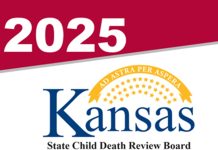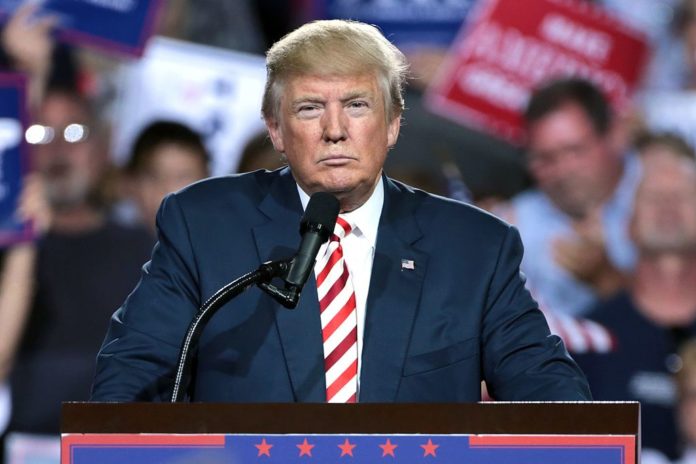President Donald Trump isn’t on the Kansas ballot this year.
He won’t decide Kansas tax policy. He won’t decide whether the state expands Medicaid. He won’t decide education funding.
But for some Republican state House candidates, Trump is lurking out there for voters who want to send a message showing their contempt for the president plan to vote Democrat straight down the ballot.
It’s a factor that could decide Kansas House races, especially in more moderate districts where antipathy toward Trump is most virulent.

“I honestly think if anyone else was president, my race would not be contentious,” said Republican state Rep. Tom Cox, who is running for re-election in a district that went for Hillary Clinton in 2016 and Paul Davis in the 2014 governor’s race.
“There are definitely Republicans that are mad at Trump, so they’re switching (to) Democrat down ballot,” Cox said.
This is a bad year for Republican legislative candidates with a Republican president at the top of the ticket who’s favorability ratings have stumbled, experts said.
Given that only 20 percent of most Americans know their state legislator, voters tend to take their cues from how they feel about the president.

“The best predictor of how someone is going to vote in a state legislative election — with party ID mattering the most — is what they think of the president,” said Steven Rogers, a political scientist at St. Louis University.
“Most voters don’t know who their state legislator is, let alone what they’re doing day to day,” said Rogers, who has studied state legislative elections. “More people have an opinion about Trump than they do about their state legislator.”
History is not on the side of Republicans going into the general election.
The president’s party loses an average of about 400 state legislative seats in midterm elections, according to the National Conference of State Legislatures.
Since 1902, the president’s party has lost legislative seats in 27 of 29 midterm elections, NCSL reports.
In the 2010 midterms when Barack Obama was president, for example, Democrats lost 708 legislative seats, the most than in any election in 44 years, NCSL reported.
That election saw the loss of a number of Democrats in the Kansas House, giving Republicans a 92-seat majority in a 125-member chamber. Going into the election, Republicans held 76 seats to 49 for the Democrats.
Rogers said the Trump influence can be regional, something Kansas politicos point out. For instance, Trump might be more problematic to Republicans in parts of Kansas like northern Johnson County than in other parts of the state.
Polling has shown, for instance, that Trump is most disliked in the 3rd Congressional District, where Republican Congressman Kevin Yoder is in a titanic struggle to win re-election against Democratic upstart Sharice Davids.
A poll made public earlier this month showed that Trump’s unfavorables were the highest in the 3rd Congressional District out of all districts in Kansas. Fifty-one percent of those polled in the 3rd District saw Trump unfavorably. Also, 53 percent of those polled thought the country was on the wrong track.
In that context, Republican candidates are running up against a possible Democratic wave that could see many vote a straight Democratic ticket regardless of whether it’s for Congress, the statehouse or statewide office in Kansas.

State Rep. Linda Gallagher, a moderate Republican lawmaker from Lenexa, has seen instances of a Trump backlash in a district that went for Clinton and Davis.
As Gallagher visits the households of Democratic, Republican and unaffiliated voters, she said she runs into isolated cases of people turned off by Republicans.
“I’ve had a handful of people say they’re not going to vote for any Republicans, or it would take a lot for them to vote for a Republican this year,” she said. “For the most part, I am getting a good reception at the door.”
Gallagher said she even had a longtime friend who reluctantly attended her fundraiser because she is a Republican. The friend didn’t donate.
“I said, ‘This is me. You know what my voting record is, and you approve of that,’ ” Gallagher recounted. “She said, ‘Yeah, you’re still a Republican. You are from the party of Trump.’ ”
Former state Rep. James Todd, who is running to recapture the seat he lost to Democrat Brett Parker in 2016, said he’s run into Trump trouble.

“I’ve gotten some pushback,” said the Overland Park Republican who opposes Trump and is running in a district that went for Clinton and Davis.
“I have heard people complain about Republicans because of Trump. For better or worse, Trump does bring out emotional responses in people.”
Todd said he understands the complaints, noting that when he meets with voters, it might be the first time they talked to someone in elected office, giving them a chance to vent about the president.
“The first thing I always do is listen to them,” Todd said. “I don’t get into the policies of what’s going on in Washington. I try to find out what’s important to them regarding Kansas politics and policies and figure how we can connect there.”
Kelly Arnold, chairman of the Kansas Republican Party, said Trump is still popular statewide and there are large swaths of the electorate that embrace his policies.
A poll earlier this month showed that 49 percent of Kansas voters viewed Trump favorably, compared to 45 percent who viewed him unfavorably. But polling indicates Kansans have mixed views depending on the issue.
Another survey by Fort Hays State University showed that 53 percent of Kansans gave Trump positive marks on the economy, and 49 percent were satisfied with his handling of national security. Only 35 percent said the president shared their values, and 38 percent thought he could be trusted.
While acknowledging pockets of anti-Trump sentiment — such as flash points in Johnson County — Arnold said he didn’t sense a backlash to the president statewide.
Johnson County Republican Party Chairman Dave Myres shared Arnold’s view that Trump trouble might be in limited areas.
“My guess is it may be more candidate/location specific,” Myres said in an email. “All of our polling is showing a very noticeable boost in enthusiasm among GOP voters since (the president) was in Topeka.”
House Minority Leader Jim Ward said Trump – coupled with conservative Republican Kris Kobach as the nominee for governor – are revving up the Democratic base.
“Certainly, the president is a polarizing figure. There’s not a lot of gray area. He’s loved or hated,” Ward said. “To our benefit — and the fear of the state — they nominated a candidate for governor who is the same thing.
“Kris Kobach has high name recognition. But there is no middle ground. You either love him or hate him, and more people hate him than love him.”
Ward’s biggest fear? How many times can he ask Republicans to cast a ballot for a Democratic candidate even if they’re mad at the president?
“At what point,” Ward said, “do they stop and say, ‘God, if I vote for any more Democrats, I’ll be a Democrat.’ ”













